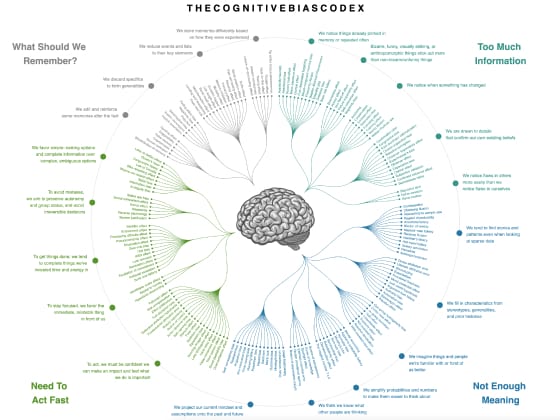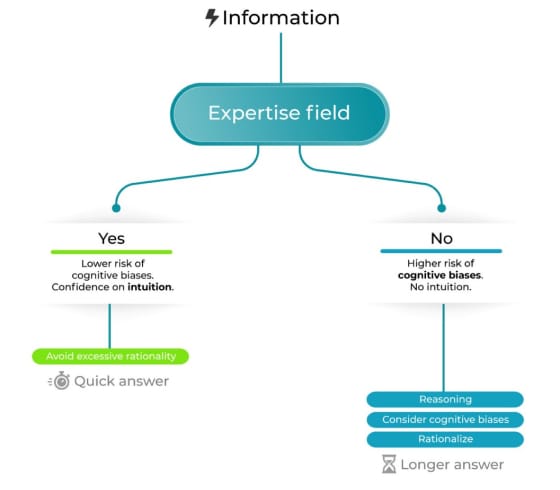
BLOG
Reflections on cognitive biases
We are far from constantly acting rationally. Neuroscience shows that our brain tends to hijack our logical thinking to simplify its analysis and thus save energy by relying on cognitive biases. Is our brain lazy? Not at all, but faced with an enormous amount of information to process and other stimuli to consider, our brain seeks efficiency: an adequate response in an adequate timeframe without consuming too much energy. This simplification allows us to:
- Filter out the overflow of information by removing what is not necessary,
- Make sense by using mental patterns to fill an information gap,
- Act quickly when there is an emergency,
- Not overloading the memory.
The writer, engineer, product leader, Buster Benson mapped all cognitive biases according to these 4 major problems: his mind map turns out to be impressive with over 200 cognitive biases represented! 🤩
EXAMPLES OF BIASES
Cognitive biases explain, for example, the fact that a person will not read an entire page that is overloaded, with their attention focused on the visually striking or strange elements. As another example, when a person is unfamiliar with an overall context, they will tend to use their biases or beliefs to fill in the blanks and form an opinion (sometimes distorted) or make a decision (sometimes irrational). 😬
BE AWARE OF IT
As a Designer, this knowledge is useful for two reasons:
To be aware of the cognitive biases of the users we study to better understand them, to create or improve interfaces that help users deal with the 4 major problems mentioned above. To be aware of one’s own cognitive biases as a designer so that one’s analyses are more accurate and respectful of reality. I’m sure this can be useful for everyone too 😉 .
But what about intuition? Can it be trusted? 🤔
 Albert Einstein wrote that “the most important thing for a scientist is not in his degrees, nor in the number of years of study, nor even in his experience, but simply in his intuition.” And nowadays, intuition is often praised as one of the main qualities of leaders (along with rigor, curiosity, self-confidence).
Albert Einstein wrote that “the most important thing for a scientist is not in his degrees, nor in the number of years of study, nor even in his experience, but simply in his intuition.” And nowadays, intuition is often praised as one of the main qualities of leaders (along with rigor, curiosity, self-confidence).
I recently read in an interview with neuroscientist Fanny Nusbaum, that in order to train oneself to perform well, it was good to “listen to your cognitive unconscious on a daily basis, to sniff out information and trigger things more quickly without checking the pros and cons for hours”.
Intuition would allow us to pick up useful information (weak signals) to make a decision without going through reason and logic; intuition would be a certainty.
THE TWO SPEEDS OF THOUGHT
The brain is a complex organ. According to the concept of the Nobel Prize winner Daniel Kahneman, our thinking would be a 2-speed system:
The first automatic, not very conscious without reasoning, The second, slower, analytical. Let’s go back to the definitions:
Intuition is a form of immediate knowledge that does not require reasoning. Cognitive biases are factors that intervene in reasoning and in the processing of information. Thus intuition would intervene at the level of system 1 whereas cognitive biases would intervene in system 2 but also in system 1 according to Daniel Kahneman.
TRUE OR FALSE
A cognitive bias is an error whose direction is predictable. Whereas an intuition is a certainty. The bias would be false and the intuition would be true.
Therefore, shouldn’t we be wary of cognitive biases and trust our intuition? However we must be able to differentiate between them. 🙃 How can we be sure that an intuition is not false? In that case we would not be talking about intuition but intuition-illusion… but then would a false intuition be a bias? 😵💫
EXPERIMENTS HAVE SHOWN THAT…
It has been proven (by experiments on large samples) that intuition proves to be right when people have experience and have learned to recognize that experience. So intuition depends on some form of expertise (Mr. Einstein, sorry, you weren’t quite right 😜). From our repeated experiences in a field comes an expertise that allows us to develop an intuition in a given field.
ANALYZE BASED ON EXPERTISE
But in any case, remember that there is no causality between a good decision and a good outcome 😉
Bibliography
Ethics and responsibility
You wonder about the stakes of your digital services.
Let's discuss sustainable digitalOther posts




